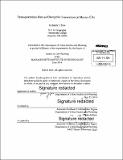Transportation data as disruptive innovation in Mexico City
Author(s)
Eros, Emily J. (Emily Jean)
DownloadFull printable version (12.30Mb)
Other Contributors
Massachusetts Institute of Technology. Department of Urban Studies and Planning.
Advisor
P. Christopher Zegras.
Terms of use
Metadata
Show full item recordAbstract
Despite the popularity of big data and smart city initiatives in rich countries, relatively few city governments in the Global South possess even basic information about public transportation routes and operations within their jurisdictions. The growing ubiquity of affordable mobile phones and internet-capable devices has enabled some developing cities to begin collecting and compiling these data. This thesis uses a 2013 data collection project undertaken within the Federal District of Mexico City as a case study to examine the role of information as a disruptive innovation in the transportation sector; it explores the potential impacts of transportation information on microbus regulators, owners/operators, and users. To do so, it draws from literature reviews, interactions with transportation agency staff, and interviews with microbus operators. Findings suggest that increased static information may increase government power with respect to microbus operators, particularly during franchising negotiations, but that it may offer limited benefits to users. Dynamic (i.e., real-time) sensors could benefit regulators, owners, and users alike, but would require genuine support or tolerance from microbus drivers. If the government continues to expand its current franchise attempts, then real-time data collection would be achievable and could offer benefits to all involved parties. Otherwise, it would be unfeasible to incentivize drivers to allow live-tracking to take place on their vehicles. Regardless, the case study suggests that transportation information can play a significant role in changing the regulatory dynamics within the Global South and encourages further efforts in the field.
Description
Thesis: M.C.P., Massachusetts Institute of Technology, Department of Urban Studies and Planning, 2014. Cataloged from PDF version of thesis. Includes bibliographical references (pages 76-84).
Date issued
2014Department
Massachusetts Institute of Technology. Department of Urban Studies and PlanningPublisher
Massachusetts Institute of Technology
Keywords
Urban Studies and Planning.